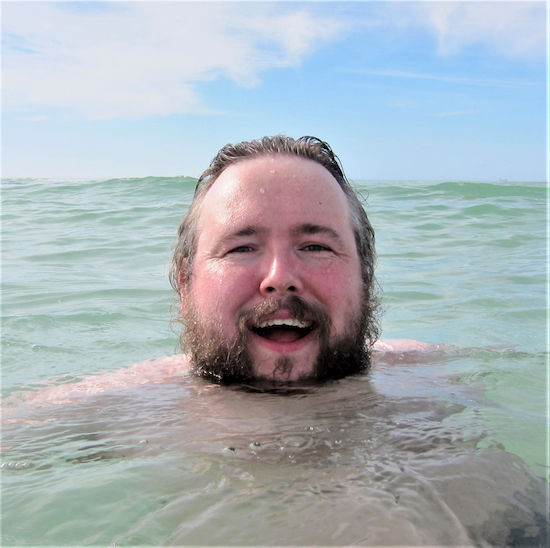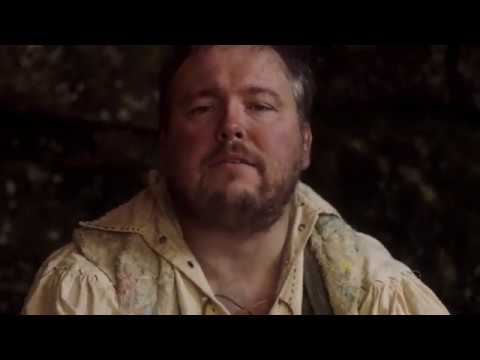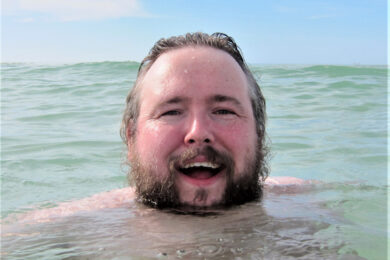The most extraordinary record of the year so far opens with a fanfare of brass, off kilter and unsettling, which dissolves into parps and squeaks. It’s not the kind of fanfare that heralds the arrival of nobility, despite it being called ‘Herald’. It’s the kind that signals something is awry, that your senses are about to be discombobulated. It’s followed by a beautiful melody, with acoustic guitar joining brass, before a massed of voices introduces the listener to what is to follow: "In the kingdom of Bryneich / verging on a muddy crook of Coquet / a dice of houses cast with clay and sheepdung / through a soup of starlit peatsmoke / gradually emerges as we make our descent."
This is your introduction to Peasant by Richard Dawson, a multi-panelled altarpiece depicting dark ages life in the north east, or what I think is the north east – Bryneich is the ancient Welsh name for the kingdom that existed in Yr Hen Ogledd, the Old North, in the area that became the kingdom of Northumbria in the seventh century. Over the subsequent 50 minutes or so, he surveys the lives of the ordinary people in a series of bewitching songs – ‘Weaver’, ‘Prostitute’, ‘Shapeshifter’, ‘Scientist’, ‘Beggar’, ‘Masseuse’ and more. And this is his pop album. (You can watch the new video for ‘Ogre’ below)
Peasant is a brilliant and captivating record, one that creates its own wholly imagined world with both music and words. Dawson writes melodies, just as he did before on Nothing Important, The Glass Trunk and The Magic Bridge. They aren’t melodies that he thrusts in your face, along with handfuls of sugar; they leap out of the murk of instrumentation, like some musical equivalent of watching a moor on a cloudy day, as lakes of golden sunlight appear and vanish on the hillside as the clouds open up and close over. But nor is this confrontational music, designed to ward off the unworthy. It’s music that rewards attention, to its detailing, to its textures, but it’s also beautiful and stirring and moving. It’s just, well, not pop music.
"I thought it was quite smooth," says Dawson, down the phone from his home in Newcastle, back after a weekend away in North Yorkshire and Cumbria. Well, Richard, it’s all relative, isn’t it? Compared to, I don’t know, many tQ favourites, then, yes, it is quite smooth. But not if you’re more accustomed to daytime radio.
"Driving around this weekend, I spent hours going through the radio stations," he observes, "and, wow, it’s really made me feel a bit despondent: there’s so much talk, but the music … It’s all the same. With this album, we wanted to make it like a creaking wooden animal so you could hear all the sinews and all the stretching of the instruments. All that information is really crucial, you know."
The musical information is provided by Dawson, on his battered, amplified acoustic guitar, along with long-term collaborators Angharad Davies (violin) and her brother Rhodri (harp) and father John (brass) plus Johnny Hedley and Matt Baty of Pigs Pigs Pigs Pigs Pigs Pigs Pigs. Lots of Dawson’s favourite musical reference points are present and correct: Eastern devotional music, English folk (though that’s something he’s ambivalent about, and metal – though there’s even a section, a minute or so into the 11-minute Masseuse, that sounds like nothing so much as hair metal riff, even if it is stripped of any Sunset Strip sheen).
But the lyrical information is just as important: "Half a fist of wizardbeard and rocktripe / yields a dye enough the whole town to paint," he sings on ‘Weaver’. Across all of Peasant, vivid images leap out – "There is a crab / caught in her hair / stetchering through the market"; "They say the monk’s returned from Iceland / unearthly boon in stow" – part reverie, part nightmare, wholly of a piece with each other.
<a href="http://thequietus.com/articles/17205-richard-dawson-interview-2 target="out">Dawson told tQ in 2015 that Nothing Important‘s 16-minute masterpiece, ‘The Vile Stuff’, had been an attempt to cross Hieronymus Bosch and Dante’s Inferno. Peasant took inspiration from another painter of panoramas. "I was thinking of it like a tapestry or a painting that might go around a whole room, thinking about Pieter Breughel the Elder, particularly, who would cover the different stratas of a community from people out in the sticks who had nothing, to people more in a city or town with more possessions and more power. Rather than approach it as individual songs first, it was to see how the whole painting would fit together."
Did you have the idea for Peasant before you began to write, or did it become apparent to you as the songs came?
Richard Dawson: I knew the topics I wanted to address, but the structure of it at the beginning was very different. The original idea was to have two albums interweaving together, like two coiling albums. There was going to be one album of songs and one album of brass that was going to be narrated. I was thinking about all kinds of actors who could narrate it – I was thinking about Harry Dean Stanton and Michael Gambon and Samantha Morton. So I would have this pre-medieval, early middle ages story unfold with a narrator and a backdrop of brass and this futuristic set of songs coexisting. But as I started to develop that and wrote a few songs, I realised that wasn’t in the air. But what was in the air was for these songs to be set somewhere between 500 and 700, after the slow withdrawal of the Roman Empire from the north east, and that seemed to be more of a way to take it. Just for the sake of clarity, the other elements of the album dropped away, apart from that very first track [‘Herald’]. It was just stripping it away until I got to the very bare bones of it.
If your notion was to create something Breughelesque, why go back another 1,000 years?
RD: There were two sides: one is the wide camera lens on the community. The other was the textures and the colours. When you look at that period [in which Breughel was working, the 16th century], there’s so much written about that, but the early middle ages, the dark ages, is much more flexible and fluid to write about because there’s so much unknown about it. The goal wasn’t to write a historical album, and it seemed like more of a blurry, foggy time and I’d have more license to play with that, perhaps. Also, really crucially, after the withdrawal, things reverted back to this almost tribal state of affairs, because the whole country was in great flux, and that seemed like a very interesting time. How did people manage to retain some honour, or look after their families when all around them the systems are in a great state of flux?
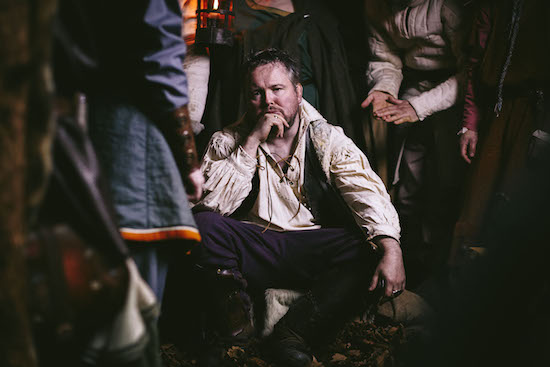
How careful was your research? The level of detail is astounding: I’m presuming your recipe for dye in the dark ages in ‘Weaver’ is accurate…
RD: Yeah. I don’t think I went off on that song until I’d spent a few days reading and researching. or this one, I looked into the makings of how the wool was prepared and then dyed. It would probably be separate people who did those roles, and also the tramping of it. It wouldn’t have been one person, more than likely. Usually I would research more as I went, line by line, but that one did take more detailed research and preparation. But you’re only getting a very general overview: I don’t have facts, I don’t have knowledge. On any topic there are people who can retain information and do a pub quiz. I just don’t have that. Once you get into the specifics of the song and where it leads you, you’re having to research as you go, and once the things starts getting out there and you play a few of the songs, that when you start finding out the more solid things, from people who are immersed in it in a way I’m not. But with facts it’s good to be foggy; I wasn’t trying to make a history lesson.
How specific is the relationship between past and present on Peasant? Some of the songs, ‘Prostitute’ and ‘Scientist’ especially, seem to use history as a prism through which to view these times: the vulnerable woman and the bought-and-sold child of ‘Prostitute’, the questioning of reason in ‘Scientist’.
RD: I don’t really want to say too much to that. I want to be really open with you, but at the same time I feel like I don’t want to be didactic about what this is. Certainly, I don’t have an interest in writing a Game Of Thrones album. I have an interest in my community and how music can help that, so it’s impossible to miss the kind of things that are happening at the moment. The problem I have found with a lot of protest art in general, and particularly protest music, is that it’s just too didactic, and it’s the protest first and the quality of the actual work loses out to the shouting. The hope is that rather than it being a battering ram to the door you can be a fog that drifts underneath the door and gets up the cuffs of your shirt rather than tears the shirt off your back. There are some things in there that you don’t have to look too hard for, and, as you say, some of the things that are described in the songs are not too different from some of the things that occur today in a supposedly civilised society. You could draw that parallel if you wanted to. I hope as many people as possible can hear this album. In a way, I’ve never really been concerned with that before, but I’m very much concerned with it with this album. That’s tied up with its success. Usually I judge a thing by the work alone and that’s it, but this is different.
Oh, you should definitely release this as a tie-in with the new series of Game of Thrones!
RD: That’s not a bad idea, actually. It’s probably not too late. I think the printing’s been done, but we could get big stickers.
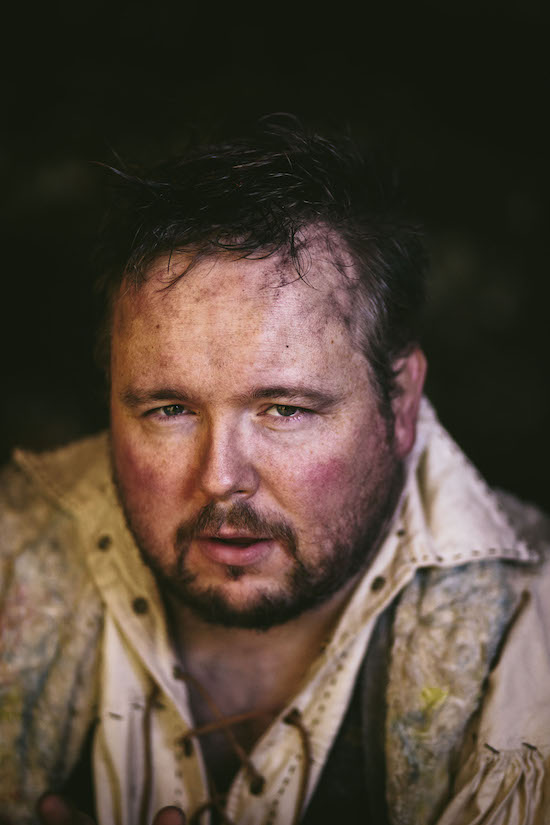
There’s a real contrast in the care you take over composition and song structure, and the random elements you introduce, such as having your guitar slightly out of tune, to create different resonances. Do you feel the interaction between formality and randomness is something that creates great music?
RD: There’s a question. It’s definitely something that fascinates me. I really love the rigour of composition and getting things right, but then how do you then invest it with a life? How do you make it fresh every time? There are different ways to do that: you can maybe make your keys a bit sticky or your strings a bit dirty; it’s like putting obstacles in your way. You just change the set-up ever so slightly so you have to really live it rather than just go through the motions. I’m really fascinated by the notion of contradiction in general. I’m more and more thinking about this word and thinking that it’s at the heart of everything; it’s like the governing energy is contradiction.
Do you find yourself drawn to the beauty of the grotesque? There was a fair amount of the grotesque on Nothing Important, especially on ‘The Vile Stuff’, and there are elements of it on Peasant, too.
RD: I agree those things can be very beautiful, but I’ve never thought of it like that. That’s not to say it’s not happening, but I’d probably prefer to avoid the grotesque wherever possible. In ‘Scientist’, for example, in the verse about raining tar on your roofs – that whole section was horrendous originally; it was the most dreadful things happening to children and it was just too much. It threatened to overtip the thing, and I think that’s the danger when you throw in strong, gory, mucky, messy, bodily things, or mental health things, or even just a swear word, it can threaten to overbalance things and I think you have to draw back from it wherever possible. Sometimes it’s not possible. I’ve read quite a few books recently, quite good books, where they get to these violent bits and suddenly the sentence count per passage goes up, and its lurid. I’m not really into that so much.
I remember my mum being disgusted by The Cook, The Thief, His Wife & Her Lover, because she couldn’t understand why so much intelligence had been deployed to make something so repulsive.
RD: [Laughs] I’m laughing because I’m trying to imagine my mam going to see that. [He laughs again, positively hooting this time.] Did you ever see the film Hard To Be A God?
I didn’t.
RD: That’s very grotesque, but it’s all just in the right places. That was in my thoughts a lot making this record. The director tried to get it made for 40 years, and it took six years to shoot. And it’s so damp and soggy, the whole film. There are constantly people leaning into camera and blowing their noses and rubbing matter on themselves, and things dangling in the camera. It’s absolutely disgusting and brilliant.
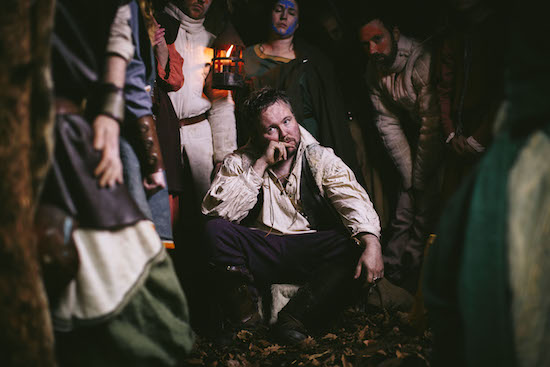
You’ve shifted subjects and styles between albums, and you always mention a dizzying range of musical influences. Is that because you don’t ever want to be pinned down?
RD: I don’t think so. I’m not concerned one way or the other.
So I can call you a folk musician, then?
RD: [Laughs] Very good. Anything but that. I would probably disagree that my albums aren’t linked thematically. In a way it’s the same themes keep cropping up on each one, in different guises maybe. I can see there are differences, too – definitely when I was younger valued the absurd. But whatever you want to say is OK.
What are the linking themes then?
RD: Family, and by extension, community. And then the others are … I don’t really want to say.
This is why I come back to you wanting to be pinned down: you could give a pat answer there, but you don’t want to give any answer.
RD: It’s not about trying to be evasive. I haven’t thought about being pinned down. I can’t really even process the question, to be honest.
When we spoke after the release of Nothing Important, we talked about the north east. You were very clear about what the north east wasn’t – trite musicals by Sting, Sir John Hall proclaiming the "Geordie Nation" – but you didn’t say what it did represent to you. So what does it stand for?
RD: It’s funny. I don’t think that would come up with every part of the UK, but it does come up wherever we’re written about – it’s always Geordie singer/songwriter. And I don’t think it really matters.
I’m not interested in Geordie stereotypes, and nor are you, but the north east crops up throughout your work. Whereas I can’t think of an artist from Norwich continually dealing with East Anglian themes.
RD: [Laughs] Yeah, I understand, and I’m not trying to be evasive. There is something about being from the north east, but it’s not specific to the north east. It’s the same over in Liverpool, it’s the same in Ireland, Scotland. Not so much when you get into the middle of England. But I haven’t lived anywhere but Newcastle, so it might just be more practical: you write about where’s close to you. I’m not a fast thinker, or clever, or particularly well read, so it’s maybe just a practical thing. There are very open people here. You can stop most anyone in the street and have a chat. It’s very welcoming, but there’s a limit to the welcome, and it’s about how you come. There’s a toughness to these places. Even in my generation where there’s not really the working class – it’s a different thing now with gentrification and what they call upscaling. But people are the same really to where they were a few hundred years ago. People are intrinsically good, but there’s a toughness there. Anyone who’s born here genuinely believes they are the most fortunate people on earth and they would not change it for the world. The other side to this is the idea – and I’ve said this before – that you can get too tied up in your geography, which causes a lot of the problems we have, the attachments to areas. And it’s completely stupid, because a lot of the places people are so proud and attached to, they’re not their places – the idea that somebody owns that land is crazy. People are directing their nationalistic furies in the wrong direction – at each other, rather than where they should be pointed.
Which seems the time to ask: how important is class to you?
It matters a lot, but only in terms of the fact that the ruling class is a tiny percentage, and it seems like an absolute crime that the royal family can exist, and we can find millions of pounds to fix up a palace, when there are people starving and killing themselves because they’ve been sanctioned under so-called austerity. The only way that can exist is if it is a conspiracy. Just divide it into a class of us and them, and them being a very small percentage of people. Other than that, everyone is a worker and generally good. Everyone is in the same boat. It seems a lot more simple that it’s made out to be.
Peasant is released on Weird World on 12th May 2017, pre-order on physical here and digital here. Richard Dawson plays this year’s Green Man Festival at Glanusk Park this summer, for tickets and more information visit the festival website

